The life of Martin J. Tubridy was the inspiration for Harry Chapin’s hit song “Mr. Tanner.”
Story by Pat Fenton
“Mr. Tanner was a cleaner from a town in the Midwest. And of all the cleaning shops around he'd made his the best. But he also was a baritone who sang while hanging clothes. He practiced scales while pressing tails and sang at local shows.”
It’s been a long, slow ride on I-95. Ahead of me are lines and lines of rowed-up tractor-trailers, shrugging and hissing. I can see them above the curve of the highway. The only distraction for me as traffic crawls along is a CD. I listen to the lyrics of “Mr. Tanner,” which I’ve heard many times before. Only now am I headed up to Connecticut to interview the real Mr. Tanner, a man who will live forever inside these lyrics.
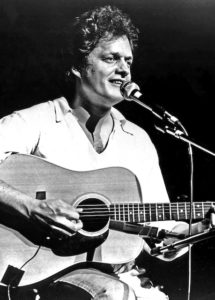
In 1974, “Mr. Tanner” became part of a Chapin album titled Short Stories. This beautiful song about not letting failure totally destroy you—about hope—describes an opera singer who dreams of one day leaving his dry cleaning shop in Dayton, Ohio, and being recognized for his talent. For years, his friends who have heard him sing have encouraged him to rent a hall in New York and let the world hear his voice.
“Finally they got to him; he would take the fling… It took most of his savings but he gladly used them all. But music was his life, it was not his livelihood, And it made him feel so happy and it made him feel so good…”
Harry Chapin got the idea for the song after reading two separate New York Times concert reviews of two separate performances in 1971 and 1972, that held nothing back in their criticism of a bass-baritone singer named Martin Tubridy, who was not a dry-cleaner but rather a baritone from Weston, Connecticut who, at one point, had rented Carnegie Hall to showcase his talent. With just a few short lines, a New York Times music critic destroyed his dreams, as Chapin wrote, using the language from the reviews in his song.
“Mr. Martin Tanner, Baritone, of Dayton, Ohio made his Town Hall debut last night. He came well prepared, but unfortunately, his presentation was not up to contemporary professional standards. His voice lacks the range of tonal color necessary to make it consistently interesting. Full-time consideration of another endeavor might be in order. “He came home to Dayton and was questioned by his friends. Then he smiled and just said nothing and he never sang again, Excepting very late at night when the shop was dark and closed. He sang softly to himself as he sorted through the clothes.”
Mr. Tanner’s story would have ended there if not for Howie Fields, the drummer for the Chapin Family Band, who contacted Martin Tubridy in 2016. The Chapin Family Band was doing a charity fundraiser in Fairfield, Connecticut. When Howie got Tubridy on the phone, he asked him to appear at the fundraiser and sing the part of Mr. Tanner in the song. Would he sing “O Holy Night” along with Big John Wallace, who does it on the CD.
The request for him to go on stage and to sing part of “Mr. Tanner” in front of a huge audience sounded surreal to Tubridy. In effect, he would be making himself vulnerable to the risk of reliving the night of rejection, the night of pain, once more.
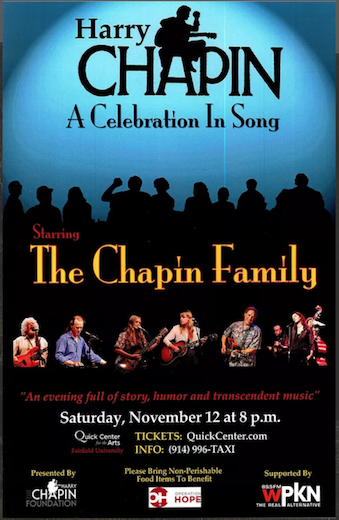
Howie Fields had assured him that the night would go well: “The audience there will be all for you; they’ll be all for Harry Chapin.” Fields even told him that there was a cult following for the song. Mike Grayeb, a board member at the Harry Chapin Foundation, also helped convince Tubridy to get back on stage. Finally, he agreed. What Howie Fields did not know was that night Big John Wallace wouldn’t be able to make it, and Martin Tubridy would be asked to sing the whole part himself – the part of Mr. Tanner.
The pre-concert reception he received from the Chapin family and guests put him at ease. Tubridy received a standing ovation that night and cheers from the crowd. His performance can be seen on YouTube. So far, there are over 50,000 views of him with the Harry Chapin band. Some viewers commented that they were moved to tears. Another called the performance “surreal.”
A writer for the Chicago Times heard about the video and was moved to write a column about it. In fact, he turned the original New York Times review into a rave review for Martin Tubridy. The Chicago Times ran the story on their front page on Christmas Eve in 2016.
The Tubridys live in a country home in the back, winding roads of Connecticut with carefully piled stone walls that flank either side. As I get closer, I think that meeting him now in person will be like meeting a character out of a quintessential American short story, like a Salinger story. I see him waiting in the doorway as I walk up the driveway. Next to him stands his wife, Marlane.
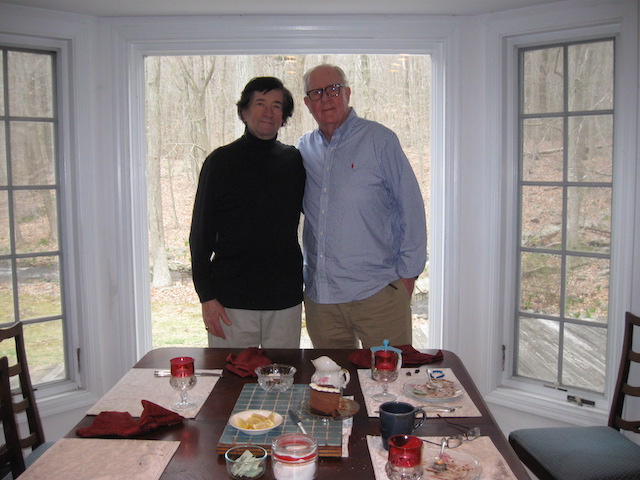
“Mr. Tanner,” I say, smiling as I put my hand forward to greet him. And then I add “Mr. Tubridy,” as he smiles back at me.
They invite me to sit at the kitchen table where we will have lunch. Though the wide picture window I see a surging stream, and beyond it are rows and rows of tall trees. Martin Tubridy has been living here for almost thirty years. He’s originally from Astoria, Queens.
Talking to him, you quickly get the feeling that he is a spiritual, modest man who lives his life conservatively – not unlike Harry Chapin’s character, Mr. Tanner. His website reveals a few facts about him: lists of his favorite music, favorite books, and also his favorite pictures. It’s no surprise that many beloved photos are of Ireland, like the Cliffs of Moher. He has roots in Ireland, he says. His family traces their heritage back to a town called Tuam, in County Galway.
Marlane places a quiche pie with broccoli and cheese on the table, and then Martin adds some homemade grain bread and a goat cheese salad he has made. It’s followed by hot tea and slices of layer cake. The perfect way to spend an afternoon with “Mr. Tanner,” I’m thinking.
“Did you ever hear “Mr. Tanner” on the radio before you were told that it was you Harry Chapin was writing about? Before you realized that you were Mr. Tanner?” I ask him.
Tubridy describes how he first felt when he heard people speculate that he was Mr. Tanner. “Initially, I felt a lot of resentment that I was being associated with the song. I started to receive phone calls from different parts of the country. One was from Long Island, another from the Boston area. Years later, I started getting emails looking for verification that I was Mr. Tanner, and I was in total denial.
“I kept saying, ‘No, I’m not from Dayton, Ohio; no, I’m not from the Midwest, no this, and no that.’ I really thought it was all untrue, and I even asked my sons, ‘How can we get rid of this? How do we disassociate?’
“Then Howie Fields sent an email in 2016, and later, he telephoned me asking if I would be interested in talking to him about a performance.”
“Did he start the phone call by asking if you were the real Mr. Tanner?”
Martin Tubridy smiles as he says, “Well, what he initially said was: ‘Are you Martin Tanner?’ After all those years, I had started believing that maybe the song was about me, but then when Howie, who was close to Harry Chapin, approached the subject, I realized, my God, this is real.”
He talks about the night of the Chapin concert and the “Mr. Tanner” performance. “Harry Chapin had intensely loyal followers. I think anyone who was at that performance that night… I think anyone who goes to these performances has deep… I want to say has a deep love, affiliation, closeness to him.
“And they see – they see him almost like a Mother Teresa. They see someone that is not just taking, taking, taking, but someone who wants to go and help and give. There was something about Harry Chapin that his whole life was about doing something about hunger.
“And I caught on to all that, and that’s what Howie Fields was describing when he persuaded me to do the performance. He said the audience there will be all for you; they’ll be all for Harry Chapin.”
How did he feel when he found out he would be singing the entire song, not just the chorus?
“My concern, obviously, was how do I go up there and not screw it up again.” (He laughs.)
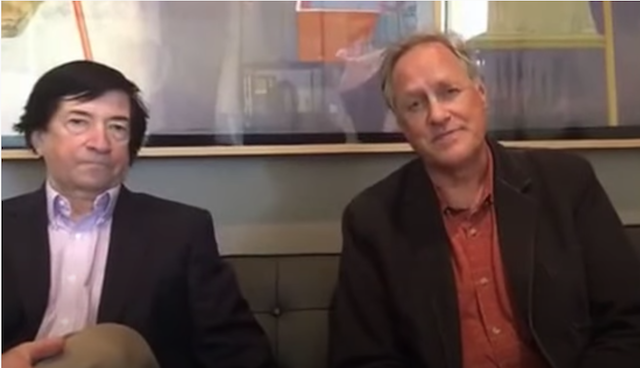
The pre-concert cocktail party helped. “People were coming up to me giving me incredible hugs. The Harry Chapin family, the audience all of them, they were just wonderful.
“They’re all givers in one way or another. They were devoting their own time and energy to a cause. There was also a devotion to Harry Chapin, to the music and to what he stood for. It was beautiful to see.”
And so, Martin Tubrity and “Mr. Tanner” were united on stage, and all went well. But it had not been easy for the singer to put himself out there again and his family were not sure that he should open up old wounds.
“When Howie Fields first mentioned my doing this, I said to Marlane, ‘What do you think?’ and she said, ‘It may be best to just let it lie. You had the experience years ago. You don’t want to get involved in all this again,’ she said.
“I went to our two sons, and they said, ‘Dad, don’t even think about it. Don’t do it. You can go on with your life. You don’t need that now.’ They didn’t want me to get hurt. I could understand it. They just saw that as too real of a possibility. But there was something in me that, I don’t know, I needed ….”
“Did you feel that you wanted another shot at it?” I ask him.
“Yeah. I kept thinking why this is happening after so many years?” Martin finally realized that he was getting the opportunity to resolve something from long ago. “I think that is when I said yes to it. There was more at play here.”
Off the kitchen area where we are sitting, is a room with two pianos and a long keyboard and other musical instruments. I point toward it.
“Late at night, when you’re alone, do you ever sit in that room and sing like you did at Carnegie Hall?”
“What do you mean, like Mr. Tanner?” And then he softly says, “No.”
Later, as I drove back down on I-95 toward New York, I couldn’t help but wonder what Harry Chapin would have felt if he had been at that concert the night the real Mr. Tanner sang “O Holy Night.”♦

Pat Fenton’s book is available on Amazon for Kindle and in hardcover.
This condensed excerpt from Searching for Harry Chapin’s America by Pat Fenton was released on July 16, 2021 to commemoration the fortieth-year this musical icon’s tragic death in a car crash in 1981. An innovative audiobook with musical cuts from Chapin’s songs is planned for release in December, 2021.
We thank Alfred Publishing for their permission to reproduce Harry Chapin’s lyrics in this excerpt.

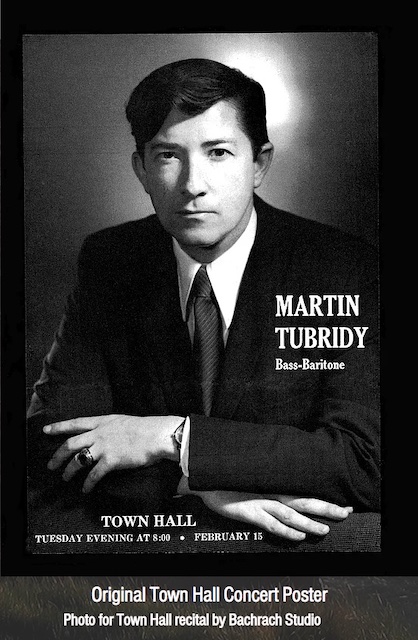
I was at the Fairfield concert and it was powerful and electric. Martin sang beautifully and the audience embraced him in a giant hug. You could feel the emotion and love. It was wonderful.